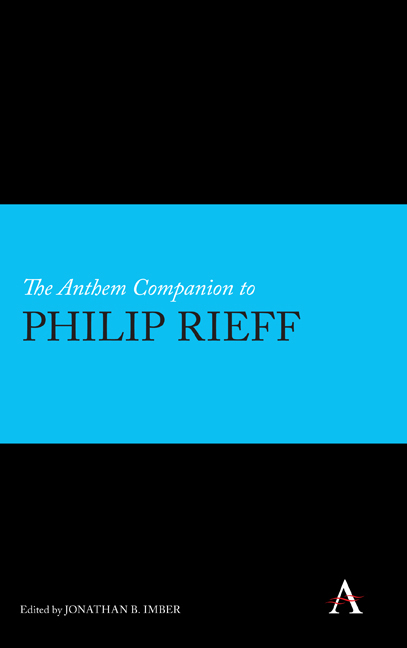Book contents
- Frontmatter
- Contents
- Introduction
- Chapter 1 Philip Rieff: Some Reflections
- Chapter 2 Philip Rieff and the Impossible Culture
- Chapter 3 Philip Rieff as Cultural Critic
- Chapter 4 Philip Rieff as Teacher
- Chapter 5 Prophet v. Stoic: Philip Rieff's Case against Freud
- Chapter 6 Decline and Fall in the Work of Philip Rieff: “I love the old questions” Beckett, Endgame
- Chapter 7 Philip Rieff as Social/ Cultural Theorist
- Chapter 8 Fellow Sons
- Chapter 9 Philip Rieff and Social Theory
- Chapter 10 A Kindly Apocalypse: Philip Rieff and the Endgame of the Therapeutic
- Chapter 11 Disenchantment, Authenticity and Ordinary Charisma
- Writings of Philip Rieff
- List of Contributors
- Index
Chapter 8 - Fellow Sons
Published online by Cambridge University Press: 21 June 2018
- Frontmatter
- Contents
- Introduction
- Chapter 1 Philip Rieff: Some Reflections
- Chapter 2 Philip Rieff and the Impossible Culture
- Chapter 3 Philip Rieff as Cultural Critic
- Chapter 4 Philip Rieff as Teacher
- Chapter 5 Prophet v. Stoic: Philip Rieff's Case against Freud
- Chapter 6 Decline and Fall in the Work of Philip Rieff: “I love the old questions” Beckett, Endgame
- Chapter 7 Philip Rieff as Social/ Cultural Theorist
- Chapter 8 Fellow Sons
- Chapter 9 Philip Rieff and Social Theory
- Chapter 10 A Kindly Apocalypse: Philip Rieff and the Endgame of the Therapeutic
- Chapter 11 Disenchantment, Authenticity and Ordinary Charisma
- Writings of Philip Rieff
- List of Contributors
- Index
Summary
Jim's own search for love is a desertion from his assigned role of authority and fatal to its assigner: the smallest boy, who can scarcely entrust his empty gun to so young and untried a father surrogate.
– Philip Rieff on Rebel Without a CauseWe Writers
What today is worth writing about Philip Rieff? The reasons for his personal retreat from “relevance”— a conscientious objection— are plain enough in the arc of his own work. Six years can go by fast or slow, but Rieff's rejection in Fellow Teachers (1972) of nearly every convention of intellectual writing published in or out of the academy— with his reputation at its height thanks to The Triumph of the Therapeutic (1966)— had the effect, however calculated, of a sharp, irreversible break with what many of us would take to be almost the principle of writing. “If I have written anything worth rereading,” he alerted his hapless, dwindling audience, “then it is necessary and right that you should misunderstand me […] If you read in order to conclude, for or against, then read at your peril. There is nothing conclusive here.” How can “we” do better— or worse? His was less a stance than a rearguard action. Because he the writer and we the readers “were not linked in a chain of interpretations, we could not have achieved a pedagogic discipline,” warned Rieff. “Where you stand is no concern of mine, as a teacher. We shall not exchange views, I trust, for the exchange is really a self- display.” Either you are within/ with the hermeneutic circle or you are against it. “You and I, fellow teachers, are the real police, whether we like it or not. No culture can survive without police of our sort— priests, teachers, whoever acts as a responsible draftsman of the ceaselessly redrawn hermeneutic circle, within which is the essential safety, from the danger of living outside it.” Wallace Stevens and his herald, Emerson, proposed a “new circle”— one that “must be drawn as a new hermeneutic void of all theological implication, and yet be received somewhere with negational enthusiasm.” Rather than the ardor of the divinely possessed (enthous), here is the hunger of the vacuum, gorging itself on the world, meaning us.
- Type
- Chapter
- Information
- The Anthem Companion to Philip Rieff , pp. 131 - 148Publisher: Anthem PressPrint publication year: 2018



